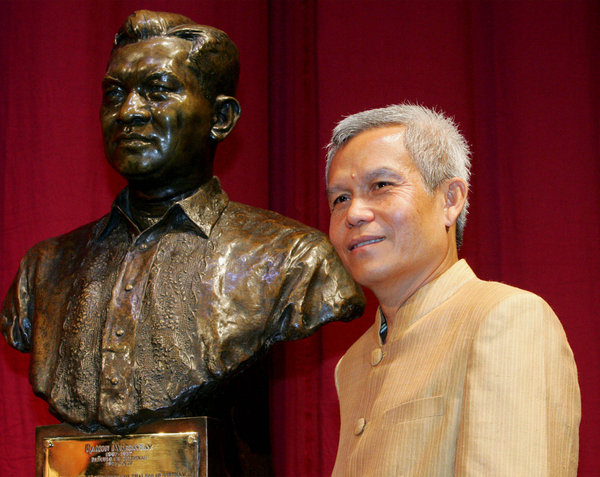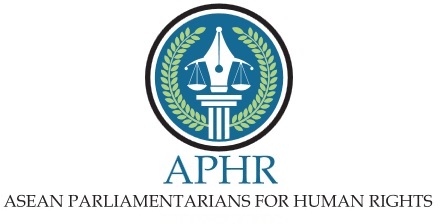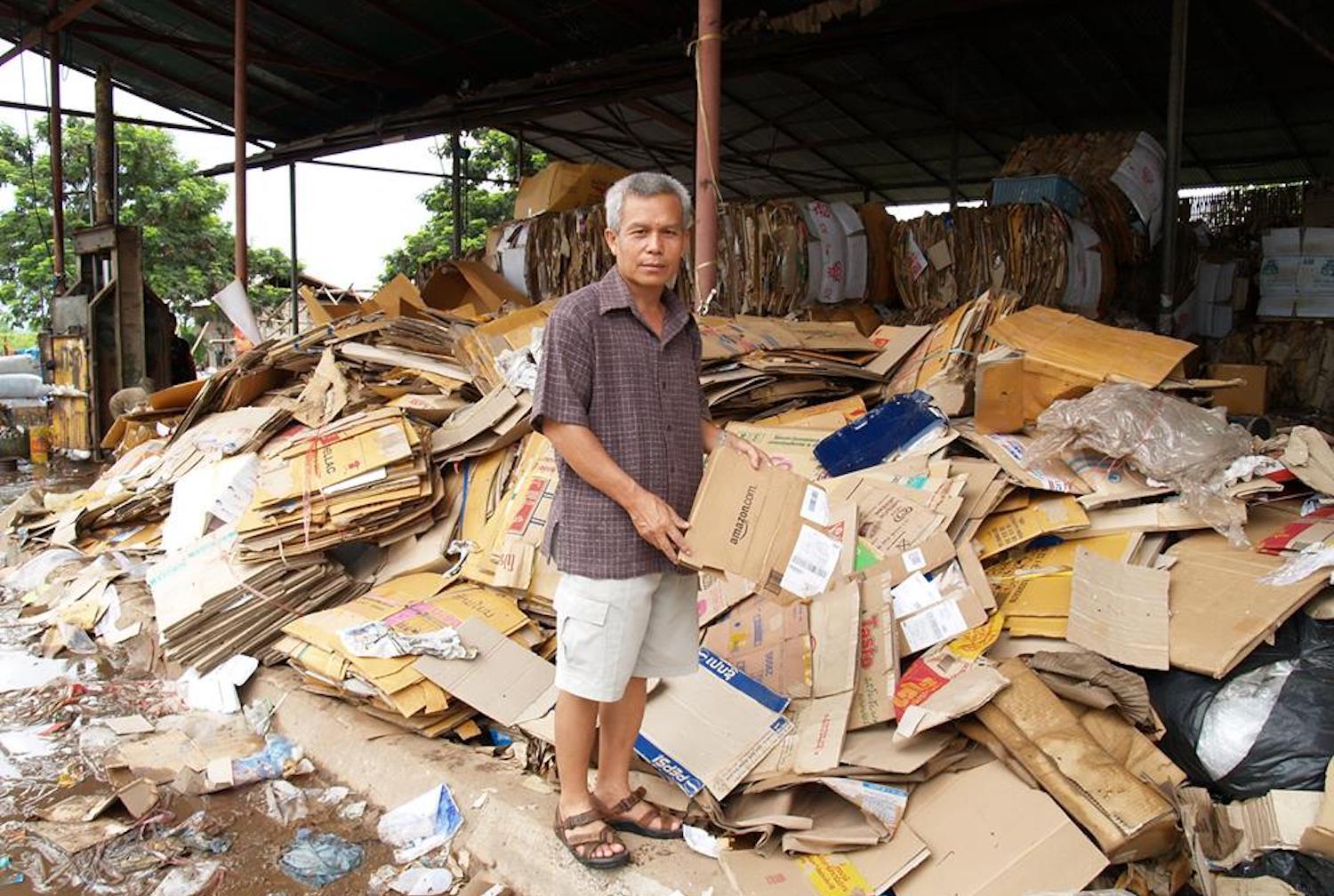Thai PBS: 18 ธันวาคม 2527
Two years on: Still no answers in disappearance of Sombath Somphone
The Diplomat: 15 December 2014

Lao leading civil rights activist Sombath Somphone, right, with his wife Shui-Meng during a drip to Bali in 2005. Pic: AP.
Two years have passed since the enforced disappearance of Sombath Somphone, a celebrated civil rights worker in Laos. Sombath was last seen being driven away in an unknown vehicle in Vientiane on Dec. 15, 2012. He has not been heard from since. Sombath’s family, friends, and colleagues continue to demand answers about his whereabouts and accountability from a government notorious for strong-arming activists and others seen as “troublemakers”.
CCTV footage shows Sombath was last seen when he was stopped at a police post in Vientiane after leaving dinner with his wife. The video shows him at the post and then being driven away in another vehicle. No one knows his whereabouts since then and the Laos government denies having knowledge about where he is, why he was detained, or what has happened to him. Continue reading “Two years on: Still no answers in disappearance of Sombath Somphone”
HRW: Lao government's investigation into Sombath case 'is a sham'
Deutsche Welle: 15 December 2014
Two years ago, prominent activist Sombath Somphone vanished from the streets of the Lao capital Vientiane. Although the authorities could give answers, they have remained silent to this day, says HRW’s Phil Robertson.  On the evening of December 15, 2012, civil society leader Sombath disappeared without a trace. He was on his way home from the office when he was pulled over at a police checkpoint. The rights activist was later taken to another vehicle and driven away. His whereabouts still remain unknown.
On the evening of December 15, 2012, civil society leader Sombath disappeared without a trace. He was on his way home from the office when he was pulled over at a police checkpoint. The rights activist was later taken to another vehicle and driven away. His whereabouts still remain unknown.
Right from the beginning, it is widely believed to be a case of enforced disappearance, with many suspecting the Southeast Asian nation’s Communist one-party government to be behind the abduction. The government, however, has so far firmly denied any responsibility for the incident. The Sombath case stirred an international outcry, with prominent figures like Hillary Clinton, John Kerry and Desmond Tutu calling for his safe return and urging the authorities not to block a thorough investigation.
Sombath had for decades campaigned for the rights of the land-locked nation’s poor rural population and the protection of environment. In 2005, he was awarded the Ramon Magsaysay Prize, considered Asia’s equivalent to the Nobel Prize. In a DW interview, Phil Robertson, Asia expert at Human Rights Watch, strongly criticizes the Lao government for their hard stance. Continue reading “HRW: Lao government's investigation into Sombath case 'is a sham'”
Pre-Session for Universal Periodic Review
 A pre-session for the Universal Periodic Review of the Lao PDR (scheduled for January, 2015) was held on 03 December in Geneva. While many international human rights organisations did not attend the session, a briefing paper summarising UPR submissions from some groups was compiled.
A pre-session for the Universal Periodic Review of the Lao PDR (scheduled for January, 2015) was held on 03 December in Geneva. While many international human rights organisations did not attend the session, a briefing paper summarising UPR submissions from some groups was compiled.
The summary includes the following recommendations:
 Immediately undertake a prompt, thorough and impartial investigation, consistent with international standards, into the apparent enforced disappearance of Sombath Somphone, publicly release original images of the closed circuit television (CCTV) video of Sombath’s disappearance, and accept offers from foreign experts to assist in examining evidence, including the CCTV footage.
Immediately undertake a prompt, thorough and impartial investigation, consistent with international standards, into the apparent enforced disappearance of Sombath Somphone, publicly release original images of the closed circuit television (CCTV) video of Sombath’s disappearance, and accept offers from foreign experts to assist in examining evidence, including the CCTV footage. Implement the commitments made during the 2010 UPR, including by becoming a party to the ICPPED and incorporating all provisions of the various international human rights treaties to which the Lao PDR is a party.
Implement the commitments made during the 2010 UPR, including by becoming a party to the ICPPED and incorporating all provisions of the various international human rights treaties to which the Lao PDR is a party.- Amend its Penal Law to provide for criminal liability for all acts of enforced disappearance and corresponding penalties accounting for the extreme seriousness of these acts.
 Allow Ng Shui Meng, Sombath Somphone’s wife, to have access to files and findings of the investigation and other information to which she is entitled.
Allow Ng Shui Meng, Sombath Somphone’s wife, to have access to files and findings of the investigation and other information to which she is entitled.- Provide Ng Shui Meng with access to an effective remedy and reparation for the enforced disappearance of her husband.
- Undertake a thorough, impartial, and effective investigation into all allegations of enforced disappearances, including those related to the nine activists
 arrested on 2 November 2009 in connection with planned peaceful demonstrations calling for democracy, justice, and respect of their land rights.
arrested on 2 November 2009 in connection with planned peaceful demonstrations calling for democracy, justice, and respect of their land rights.
Laos stands out…
Laos stands out in contrast to neighbours like Myanmar, which despite its long-time rule by the military managed to develop an independent civil society, according to John Sifton, Asia Advocacy Director of the Washington-based Human Rights Watch.
“If a human rights defender like Aung Sang Suu Kyi were to stand up in Laos and speak out against authoritarian rule, she would be immediately arrested. And unlike Aung Sang Suu Kyi, having the luxury of living under house arrest, you would just be taken off to prison and never seen again,” he said.
“Laos NGO restrictions threaten development, say non-profit groups,” South China Morning Post, 17 September 2014
Wall of silence around activist's disappearance
The Nation: 17 June 2014
Phil Robertson
A year and a half later, where is Sombath Somphone? In Laos that simple question has been blocked by a wall of silence.
He was last seen driving home on December 15, 2012, in the capital, Vientiane, before he was forcibly disappeared. Government security video footage clearly shows that he was stopped at a police checkpoint, taken into the office, and then brought out and forced into another vehicle. Credible reports placed him later that night at a police station in Vientiane, and since then he has not been seen or heard from again.
Sombath Somphone is an internationally acclaimed civil society leader and 2005 Magsaysay Award winner who concentrated his life’s efforts on agricultural development in Laos. Hailing from a modest rural background, he possessed an acute understanding of rural poverty and the need to improve agricultural productivity and sustainability in ways that would positively impact the lives of Laos’ farming communities.
Yesterday marked a dark mid-term anniversary: exactly a year and a half since Sombath’s “disappearance”. Since then, the Laos government has repeatedly failed to conduct a serious investigation, much less push for accountability and provide answers. Offers by governments such as United States and others to provide technical assistance to the Lao authorities to analyse the video showing Sombath’s arrest have been repeatedly turned down. At one point, one of the investigating police officers publicly stated that the investigation had been halted, only to be contradicted by a more senior officer following international outcry. Continue reading “Wall of silence around activist's disappearance”
Le gouvernement accusé de bafouer les droits de l’homme
Société des Missions étrangères de Paris: 12 Juin 2014

Un rapport présenté le 10 juin dernier aux Nations Unies dénonce les violations persistantes des droits de l’homme au Laos. Parmi les nombreux exemples cités par l’organisation Human Rights Watch, la disparition du militant Sombath Somphone a été qualifiée de « particulièrement inquiétante ».
Le Laos, loin d’avoir progressé dans le domaine des droits de l’homme, a encore reculé, uge dans un rapport très critique Human Rights Watch (HRW). Le gouvernement poursuit ses restrictions des libertés fondamentales d’une façon drastique, justifiant l’attention de la communauté internationale.
Parmi les « faits particulièrement inquiétants », soulignés par Phil Robertson, directeur pour l’Asie de HRW, restent les disparitions inexpliquées de Sombath Somphone en décembre 2012 et de l’écologiste Sompawn Khantisouk, porté disparu depuis sa convocation au poste de police en janvier 2007. Sur ces points, comme sur toutes les questions touchant les droits de l’homme, « les autorités laotiennes défient la communauté internationale en refusant de répondre à ses inquiétudes légitimes concernant les nombreuses disparitions inexpliquées et autres abus qui se multiplient dans le pays ».
Le Laos sera pour la seconde fois sur la sellette lors de l’examen périodique universel (EPU) (1) qui se tiendra en octobre prochain devant le Conseil des droits de l’homme des Nations Unies à Genève. Selon l’ONU, le gouvernement laotien n’a pas respecté les engagements pris lors de la précédente session de l’EPU en 2010. Le pays devait, entre autres, ratifier les conventions internationales concernant les droits de l’homme, mettre fin aux restrictions concernant la liberté d’expression, d’association et de réunion, garantir la liberté de la presse et mettre en conformité sa législation du travail avec les standards de l’Organisation internationale du travail (OIT). Continue reading “Le gouvernement accusé de bafouer les droits de l’homme”
HRW condemns Laos government’s gross rights violation
Asia Correspondent: 12 June 2104

The Laos government routinely oppresses citizens, stifles basic human rights, and acts with impunity, Human Rights Watch said in a critique issued this week. The organization blasted the Southeast Asian country’s leaders for restricting “fundamental rights including freedom of speech, association, and assembly.” The critique concerns Laos’ failures to live up to recommendations issued in a 2010 Universal Periodic Review. The country is up for another review in October, and HRW believes the last UPR did not address critical areas, including “enforced disappearances; freedom of speech, association, and assembly; the treatment of detainees in drug detention centers; and labor rights.”
The critique notes the tight control the state exerts over the media, and a culture of self-censorship. News programs that encourage debate and discussion of hot-button rights issues are at risk of being shut down, and activists live with the real threat of harm and kidnapping.
HRW emphasized the country’s policy of enforced disappearance, particularly the high-profile case of Sombath Somphone, an activist who has been missing since 2012. Continue reading “HRW condemns Laos government’s gross rights violation”
人權觀察組織:寮國人權無進展
中央社商情網: 10 六月 2014
(中央社記者林憬屏曼谷2014年6月10日專電)人權觀察組織今天指出,寮國政府無法解決系統性的人權問題,包括嚴重限制基本自由、缺乏勞工權、未起訴就拘禁吸毒嫌犯,公民社會領袖頌巴斯失蹤至今仍令外界關注。
頌巴斯(Sombath Somphone)2012年12月在永珍被警方攔阻後失蹤至今,另一名環保人士宋包(Sompawn Khantisouk)2007年向警方報告後也失蹤。
人權觀察組織(Human Right Watch)亞洲副主任羅伯森(Phil Robertson)透過聲明指出,頌巴斯被強制失蹤,寮國當局以漠視抗拒國際社會對此案的關注,有關各國的政府不應坐視。
聯合國人權理事會今年10月將對寮國進行第2次的「全球定期審議」,檢視人權狀況。
人權觀察組織指出,寮國政府在2010年第1次全球定期審議上作出的承諾,一直無法作出具體改變,寮國應該批准國際人權公約,終止對言論、集會、結社、媒體的限制,寮國的勞工法仍無法達到國際標準。
人權觀察組織表示,寮國政府應該調查並終止毒品拘禁中心濫權的情況,改由有適當醫療、自發性、社區為主的方式,對毒品依賴進行治療。
羅伯森說,寮國政府無法容忍人民持有異議,以傷害人權的法律與長期拘禁避免任何人挑戰它的權力,寮國人民害怕政府,因為他們知道官員幾乎可以不受懲罰。
人權觀察組織今天把寮國的人權紀錄評論提交給聯合國,評論中指控寮國政府無法解決系統性的人權問題。
Laos: No Progress on Rights
Human Rights Watch: 10 June 2012
Urgently End Disappearances, Systematic Suppression of Basic Freedoms

The government of Laos has failed to address the country’s systemic human rights problems, Human Rights Watch said today in a critique of Lao’s human rights record submitted to the United Nations. Laos will appear for the country’s second Universal Periodic Review in October 2014 at the UN Human Rights Council in Geneva.
Human Rights Watch highlighted several human rights issues that deserve international attention, including severe restrictions on fundamental liberties, absence of labor rights, and detention of suspected drug users without charge in abusive drug centers. Of particular concern is the forced disappearance of civil society leader Sombath Somphone, in Vientiane in December 2012 after he was stopped by the police, and of an environmentalist, Sompawn Khantisouk, who has been missing since he was ordered to report to a police station in January 2007.
“The Lao authorities are defying international concerns by ignoring calls to respond to the enforced disappearance of activist Sombath Somphone,” said Phil Robertson, deputy Asia director. “Concerned governments need to drive home the point that they will not sit complacently by as disappearances and other abuses multiply in Laos.” Continue reading “Laos: No Progress on Rights”

